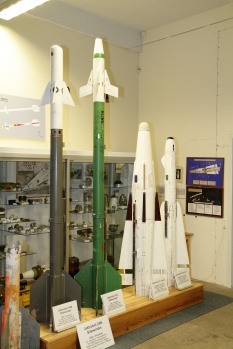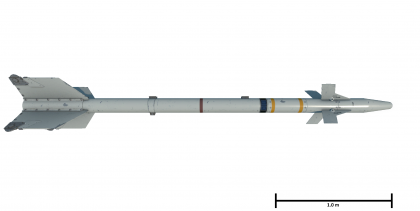Difference between revisions of "AIM-9P Sidewinder"
Colok76286 (talk | contribs) (→Vehicles equipped with this weapon: Added F-104S TAF (Italy)) |
(→History) |
||
| Line 75: | Line 75: | ||
== History == | == History == | ||
<!-- ''Examine the history of the creation and combat usage of the weapon in more detail than in the introduction. If the historical reference turns out to be too long, take it to a separate article, taking a link to the article about the weapon and adding a block "/History" (example: <nowiki>https://wiki.warthunder.com/(Weapon-name)/History</nowiki>) and add a link to it here using the <code>main</code> template. Be sure to reference text and sources by using <code><nowiki><ref></ref></nowiki></code>, as well as adding them at the end of the article with <code><nowiki><references /></nowiki></code>.'' --> | <!-- ''Examine the history of the creation and combat usage of the weapon in more detail than in the introduction. If the historical reference turns out to be too long, take it to a separate article, taking a link to the article about the weapon and adding a block "/History" (example: <nowiki>https://wiki.warthunder.com/(Weapon-name)/History</nowiki>) and add a link to it here using the <code>main</code> template. Be sure to reference text and sources by using <code><nowiki><ref></ref></nowiki></code>, as well as adding them at the end of the article with <code><nowiki><references /></nowiki></code>.'' --> | ||
| − | When the [[AIM-9L Sidewinder]] began to be put into production in 1976 replace other Sidewinder variants as the United States' main {{annotation|IR|infrared}} missile,<ref name="WestrumPG1">Westrum 2013, p.196</ref> a need was created for Sidewinders to offer to the United States' allies that did not need or were not allowed access to the newest AIM-9 Sidewinder variants and their associated features such as all-aspect locking.<ref name="ParschAIM9">Parsch 2008</ref> | + | When the [[AIM-9L Sidewinder]] began to be put into production in 1976 to replace other Sidewinder variants as the United States' main {{annotation|IR|infrared}} missile,<ref name="WestrumPG1">Westrum 2013, p.196</ref> a need was created for Sidewinders to offer to the United States' allies that did not need or were not allowed access to the newest AIM-9 Sidewinder variants and their associated features such as all-aspect locking.<ref name="ParschAIM9">Parsch 2008</ref> |
| − | The '''AIM-9P''' Sidewinder missile was developed as a family of export missiles. Sponsored by the US Air Force, this variant was based off the [[AIM-9J Sidewinder|AIM-9J]]/N variants, though | + | The '''AIM-9P''' Sidewinder missile was developed as a family of export missiles. Sponsored by the US Air Force, this variant was based off the [[AIM-9J Sidewinder|AIM-9J]]/N variants, though would be updated multiple times incorporating new features and improvements.<ref name="ParschAIM9" /><ref name="KoppAUSAIM9">Kopp 2014</ref> |
[[File:RB24B_RB24J_RB27_RB28.jpg|right|thumb|x350px|none|A row of Swedish missile armaments for aircraft. A [[RB24J]] (Swedish designation for an AIM-9P-3) is seen second from the left.]] | [[File:RB24B_RB24J_RB27_RB28.jpg|right|thumb|x350px|none|A row of Swedish missile armaments for aircraft. A [[RB24J]] (Swedish designation for an AIM-9P-3) is seen second from the left.]] | ||
;Variants of the AIM-9P: | ;Variants of the AIM-9P: | ||
| − | * '''AIM-9P''' - The first version, which is an improved AIM-9J model with greater engagement ranges. It also incorporates solid-state technology for better reliability and maintainability. Deliveries of this missile | + | * '''AIM-9P''' - The first version, which is an improved AIM-9J model with greater engagement ranges. It also incorporates solid-state technology for better reliability and maintainability. Deliveries of this missile started in 1978.<ref name="GlobalSecAIM9">GlobalSecurity.org "AIM-9 Sidewinder"</ref> |
* '''AIM-9P-1''' - Introduces an active optical target detector with the DSU-15/B AOTD laser proximity fuze, replacing the old infrared influence fuze.<ref name="ParschAIM9" /><ref name="GlobalSecAIM9" /> | * '''AIM-9P-1''' - Introduces an active optical target detector with the DSU-15/B AOTD laser proximity fuze, replacing the old infrared influence fuze.<ref name="ParschAIM9" /><ref name="GlobalSecAIM9" /> | ||
* '''AIM-9P-2''' - Introduces a reduced-smoke rocket motor.<ref name="ParschAIM9" /><ref name="GlobalSecAIM9" /> | * '''AIM-9P-2''' - Introduces a reduced-smoke rocket motor.<ref name="ParschAIM9" /><ref name="GlobalSecAIM9" /> | ||
Revision as of 11:08, 15 January 2023
| This page is about the American air-to-air missile AIM-9P Sidewinder. For other versions, see AIM-9 Sidewinder (Family). |
Contents
Description
The AIM-9P Sidewinder is an American infrared homing air-to-air missile, it was introduced in Update "New Power".
As an export version of the AIM-9 Sidewinder, the AIM-9P delivers performance akin to that of the AIM-9J that allows for the AIM-9P to be used as a dogfighting missile against low-manoeuvring aircraft.
Vehicles equipped with this weapon
General info
| Missile characteristics | |
|---|---|
| Mass | 76 kg |
| Guidance | IR |
| Aspect | Rear-aspect |
| Lock range (rear-aspect) | 5.5 km |
| Launch range | 18 km |
| Maximum speed | 2.5 M |
| Maximum overload | 20 G |
| Missile guidance time | 40 secs |
| Explosive mass | 7.62 kg TNTeq |
Effective damage
Describe the type of damage produced by this type of missile (high explosive, splash damage, etc)
Comparison with analogues
The AIM-9P is an export version of the US AIM-9J sold to China mostly. The AIM-9P has the same performance as the AIM-9J used in the American tech tree.
Usage in battles
The AIM-9P Sidewinder can be used in battle as an air-to-air missile. You would have to fire the missile while locked on from behind because it is a "Rear Aspect" missile.
Pros and cons
Pros:
- 20G maximum overload
- Simple point-lock-shoot user usage
Cons:
- Still quite easy for an aware enemy to dodge due to its small seeker gimble range
History
When the AIM-9L Sidewinder began to be put into production in 1976 to replace other Sidewinder variants as the United States' main IR missile,[1] a need was created for Sidewinders to offer to the United States' allies that did not need or were not allowed access to the newest AIM-9 Sidewinder variants and their associated features such as all-aspect locking.[2]
The AIM-9P Sidewinder missile was developed as a family of export missiles. Sponsored by the US Air Force, this variant was based off the AIM-9J/N variants, though would be updated multiple times incorporating new features and improvements.[2][3]

- Variants of the AIM-9P
- AIM-9P - The first version, which is an improved AIM-9J model with greater engagement ranges. It also incorporates solid-state technology for better reliability and maintainability. Deliveries of this missile started in 1978.[4]
- AIM-9P-1 - Introduces an active optical target detector with the DSU-15/B AOTD laser proximity fuze, replacing the old infrared influence fuze.[2][4]
- AIM-9P-2 - Introduces a reduced-smoke rocket motor.[2][4]
- AIM-9P-3 - Alongside the reduced-smoke rocket motor like the preceding P-2, the P-3 also includes a new insensitive munitions warhead and improved guidance and control section. Fuzing appears to be a mix of the original infrared fuze or the active optical target detector as the P-1.[2][4] The AIM-9P-3 is also the basis of the Swedish RB24J missile.[5]
- AIM-9P-4 - Introduces ALASCA features and technology of the AIM-9L variants.[2] However, it is considered less agile to the AIM-9L variant.[3]
- AIM-9P-5 - Introduces IRCCM incorporated in the AIM-9M variant.[2] This model is also the basis of the Swedish RB74, or RB24L, missile.[5]
More than 21,000 AIM-9P models were built during its production, though many were rebuilt AIM-9B/E/J. Despite being slated for export use, most of the missiles are in US Air Force inventory.[2]
Media
Excellent additions to the article would be video guides, screenshots from the game, and photos.
See also
- Related development
External links
References
- Citations
- Bibliography
- GlobalSecurity.org "AIM-9 Sidewinder." GlobalSecurity.org, Website. Accessed 02 Apr 2021 (Archive).
- Goebel, Greg. "The Falcon & Sidewinder Air-To-Air Missiles." Air Vectors, 01 Mar. 2021, Website. Accessed 02 Apr 2021 (Archive).
- Kopp, Carlo. "The Sidewinder Story: The Evolution of the AIM-9 Missile." Air Power Australia, 27 Jan 2014, Website. Accessed 02 Apr 2021 (Archive).
- Parsch, Andreas. "AIM-9." Directory of U.S. Military Rockets and Missiles, Designation-Systems.Net, 09 July 2008, Website. Accessed 02 Apr 2021 (Archive).
- Westrum, Ron. Sidewinder; Creative Missile Development at China Lake. Naval Institute Press, 30 Sep. 2013.




